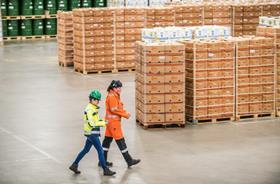
Despite the considerable challenges presented by the Covid-19 pandemic, the Port of Antwerp has announced strong growth in volumes of reefer containers for perishables during the first quarter of 2020.
'The exceptional volumes are the result of the port's growing role in the reefer market and increased demand for healthy food and pharmaceutical products during this period,' the port revealed.
A total of 252,452 TEUs of reefer containers were reportedly processed, an increase of 23 per cent compared with the first quarter of 2019.
'This is exceptional growth,' the port stated, 'compared to 3.8 and 7.2 per cent in the first quarter of 2018 and 2019 respectively, given the difficult conditions resulting from the coronavirus crisis.'
Since the outbreak, the port has remained fully operational, which it attributes to the daily efforts and commitment of the entire port community.
'This allowed the port to continue to fulfil its role as an indispensable link for supplying Europe and contributing to an efficient supply chain,' a statement from the port read. 'Despite the challenges, the experienced service providers continued to guarantee fast and high-quality unloading. Various logistical services, such as storage and handling customs and food inspection formalities, continued to run efficiently. After a few relaxations in the handling of phytosanitary documents, it was also possible to work digitally, so that in the event that an original certificate was missing, no blockages were created.'
Johan Claes, general director of Sea-Invest, Belgian New Fruit Wharf, commented: “Throughout the entire period, we have succeeded in keeping customer inconvenience to an absolute minimum. It has taken a great deal of investment and effort to comply with all the guidelines, as well as enormous commitment and flexibility from our employees. This ensured that we did not experience any delays during our logistical operations.”
Marc Beliën, Head of the Local Inspection Unit in Antwerp for the FASFC, added: “FASFC had a business continuity plan ready, aiming to guarantee the continuity of the FASFC's jurisdiction, despite the impact of a crisis situation. It stipulates that import and export inspections of foodstuffs are a priority task and must under no circumstances be interrupted. This ensured an effective response to the measures and risks posed by Covid-19. For example, the use of digital certificates instead of a paper version. Thanks to our flexible personnel plan, we have also been able to cope with the increased number of inspections. These are the result of the increased import activities at the Port of Antwerp on the one hand, and of the recently amended Plant Health regulations that have come into force throughout Europe on the other.'
The Port of Antwerp's increasingly important role in the reefer market is in part down to its favourable inland and central location.
'Container shipping companies working in the major reefer markets are increasingly choosing Antwerp as their first European port of call,' the port stated. 'It offers shippers of perishables short transit times to key consumer markets in Europe.'
Annemie Bosschaerts, reefer manager at MSC Belgium, commented: 'For the crucial perishable trades, MSC continues to consciously choose Antwerp as its first port of call, given its strategic location and gateway to and from Europe. MSC also takes its responsibility as a key player in the distribution of essential food and pharmaceutical products. We always provide sufficient capacity and equipment for this, and MSC has also given full preference to Antwerp in positioning its largest reefer repair shop, S11.'
'These exceptional figures for the first quarter confirm our efforts to be the perishables port of choice in Europe,' said Ingrid Vanstreels, key account manager Shippers & Forwarders at the Port of Antwerp. 'And thanks to the dedication of the entire port platform, we have indeed been able to achieve this during the difficult circumstances of recent months.'



